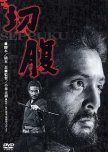The best Anti-Samurai film to be ever made...
Unemployment has always been a tragic consequence of change and modernisation. What if this situation occurred at a time when there was no pension, no unemployment benefits and the moral code was not able to keep up with the times?
To me Harakiri had elements of a job interview gone horribly wrong. Considering the past two pandemic years where a lot of people became jobless, this movie hits close to home and makes me feel really thankful that we live in different times.
Story:
The time is 1630 - Japan. We have a ronin (wandering unemployed samurai) Tsugumo, who goes to a clan house and requests permission to kill himself i.e commit Harakiri. The clan elder Saito tells him a story designed to discourage this but the tables are turned when Tsugumo skilfully humiliates the leader in front of his retainers.
This is an anti-establishment film that portrays the flawed bushido code hiding behind a facade of honour and morality. It depicts the tragic circumstances surrounding ritual suicide and provides a potent message which I think is relevant as long as authoritarian regimes exist in this world. We are all born into a system that influences our thinking and behaviour. Be it cultural or political, the system defines our actions and when we are faced with an ethical dilemma it can challenge what we think to be right or wrong. A similar situation forces Tsugumo to give up his ideals and deal with it in the only way he knows - sepukku/ harakiri.
The story is poignant and the thought evoking screenplay by acclaimed screenwriter Shinobu Hashimoto is brought to life by Kobayashi in an extremely mesmerising narrative structure with some beautiful stills and graceful cinematography by Yoshio Miyajima.
Acting:
Tatsuya Nakadai as Tsugumo delivers a flawless performance. His calm demeanour in the initial sequence really brings in the sombre mood of the film.
Mikuni Rentaro does a splendid job as Saito. The acting in this film overall is superb but the direction by Kobayashi elevates this film to brilliance.
Overall:
There are a lot of symbolic shots during the opening and closing sequences that reflect the tarnished glory of feudal Japan. History is written by the victors and the ending shot of the samurai armour sears it into the minds of us viewers as it brings forth the hypocrisy of feudal Japan.
With a brilliant screenplay, an amazing director and the wonderful acting of every cast member, this is undoubtedly one of the most thought provoking samurai film to be ever made!
A solid 10 from me.
To me Harakiri had elements of a job interview gone horribly wrong. Considering the past two pandemic years where a lot of people became jobless, this movie hits close to home and makes me feel really thankful that we live in different times.
Story:
The time is 1630 - Japan. We have a ronin (wandering unemployed samurai) Tsugumo, who goes to a clan house and requests permission to kill himself i.e commit Harakiri. The clan elder Saito tells him a story designed to discourage this but the tables are turned when Tsugumo skilfully humiliates the leader in front of his retainers.
This is an anti-establishment film that portrays the flawed bushido code hiding behind a facade of honour and morality. It depicts the tragic circumstances surrounding ritual suicide and provides a potent message which I think is relevant as long as authoritarian regimes exist in this world. We are all born into a system that influences our thinking and behaviour. Be it cultural or political, the system defines our actions and when we are faced with an ethical dilemma it can challenge what we think to be right or wrong. A similar situation forces Tsugumo to give up his ideals and deal with it in the only way he knows - sepukku/ harakiri.
The story is poignant and the thought evoking screenplay by acclaimed screenwriter Shinobu Hashimoto is brought to life by Kobayashi in an extremely mesmerising narrative structure with some beautiful stills and graceful cinematography by Yoshio Miyajima.
Acting:
Tatsuya Nakadai as Tsugumo delivers a flawless performance. His calm demeanour in the initial sequence really brings in the sombre mood of the film.
Mikuni Rentaro does a splendid job as Saito. The acting in this film overall is superb but the direction by Kobayashi elevates this film to brilliance.
Overall:
There are a lot of symbolic shots during the opening and closing sequences that reflect the tarnished glory of feudal Japan. History is written by the victors and the ending shot of the samurai armour sears it into the minds of us viewers as it brings forth the hypocrisy of feudal Japan.
With a brilliant screenplay, an amazing director and the wonderful acting of every cast member, this is undoubtedly one of the most thought provoking samurai film to be ever made!
A solid 10 from me.
Was this review helpful to you?

 2
2 2
2























